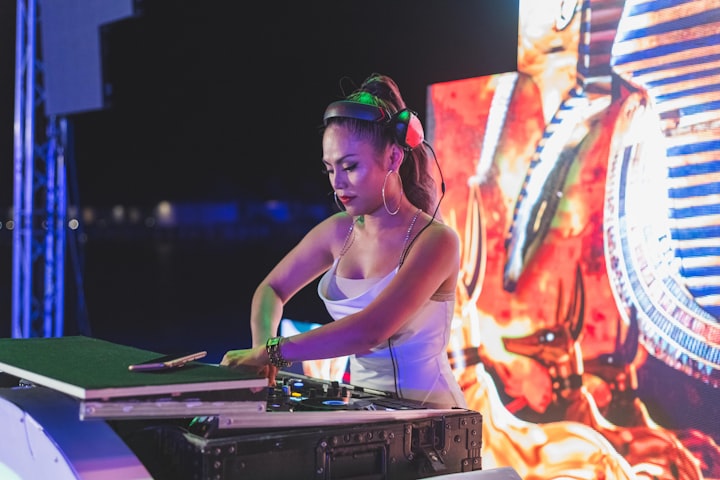The 48-year-old DJ
How I learned to DJ in the pandemic.

(No, that's not me, she's just hot af.)
Y’all remember March 2020? Yeah it was weird and none of us expected it to last very long, so we delved into the world of online communicating with gusto. All the online performances, the nightly online teas and morning coffees with friends, the dance parties, the million and one touching videos of people playing music together across balconies in Europe… It wasn’t that bad for a minute if you had internet access. But then of course, it kept going, and ‘Zoom fatigue’ entered our vocabulary.
My attention span began to shrink from all the screen time at home. I ran out of things to think or write about other than how much it had started to suck. I started turning off my camera during Zoom meetings and getting distracted by the eraser collection on my desk. If I was lucky, no one called on me for anything and I could pop back in for that little goodbye wave and a fake smile. That was great, thanks so much!
One place that held my attention more than most though? Live-streaming DJs. Lots of my favorites had gone live on Twitch, Youtube, Reddit and elsewhere, and suddenly, I had access to them again. Not only was I grateful to hear and see my old favorites, but I kinda got the itch, myself. After all, everybody wants to be a DJ, and, you know, pandemic. With all the time in the world, now seemed as good a time as any to finally do it, so I did a bunch of research, got some basic gear and went for it. In case you’re curious, here’s how:

Learning to DJ for beginners
Caveat: I may be old, but I’m also old school. I was raised by a disco queen and born into house music. When it hit, I got swept right up to the gospel altar. If you know, you know, and once you’re hooked, you don’t ever stop loving it (and if you do, I don’t know you). During the height of my club and rave days, I had some really baggy jeans and a lot of DJ friends… We called anyone obsessed with the music ‘heads’, and I was definitely a head, and proud of it — but little did any of my friends know that being “always the dancer, never the DJ” got to me, more than a little.
The reason I never did it before? In my heyday, people DJ’d on turntables (and many still do). But turntables require settled space, as does the wall of vinyl one eventually collects. That didn’t work for me. I moved a lot, and was still in the “renting a room in a house” phase of my life.
Fast forward 30 years, and things have changed. We now carry computers in our pockets and I’m a grown-ass adult with decent credit and my own place.

What you need to learn to DJ at home
1: A laptop and software
These days, much smaller hardware and digital music have made learning to mix a different and much more portable experience. If you can’t or don’t want to make an immediate investment, you can start with just your laptop (and some decent headphones — you need decent headphones).
One way to test the waters this way is Virtual DJ — it’s amazing, it’s free, and if you eventually want to use it with hardware, you can do that, too. Serato DJ Light is also popular for this, as is Traktor DJ 2 and Rekordbox. Apple users also have access to algoriddim’s djay app.
2. Music
No matter what, you’re going to need music. If you don’t already have a sizeable digital music collection, most of these free software programs I just mentioned can connect with some or all of the following: Soundcloud Go+, Spotify, Tidal, and iTunes.
You can also sign up for a streaming service like Beatport Link where, for a monthly fee, you have streaming access to a massive selection of their catalog
Keep in mind though, that in order to use this (or any other streaming service) to DJ, you’ll need to have a stable internet connection or pay for a premium-level membership that allows you to download tracks to your computer for playing offline.
I have Beatport Link, because it has a big selection of house music, breaks, and UK Garage, which are my favorite dance music genres. If I find I keep playing a track a lot, I buy it and add it to my permanent collection, but having a streaming membership keeps my music collection from getting cluttered with one-hit wonders.
Lots of professional DJs use DJ pools, too. I haven’t gotten into that yet, but apparently it’s the way once you get serious.
Additionally, I keep my purchased music stored in a cloud and also on a portable hard drive, because I am extra. Be extra about your digital music collection.

3. Hardware
The above is a picture of the Traktor S2 MK3, which is a great little 2-channel controller to start on. You can find them used pretty cheaply, and you can usually sell them pretty quickly when you're ready to upgrade (or quit, as the case may be). I started on one of these but I quickly upgraded to a 4-channel mixer because for some reason (ADHD maybe), it was actually easier for me.
As I said, you don’t need gear to begin with, but I like the physical component of tweaking knobs, sliding faders and pushing buttons. It appeals to my inner little kid and makes for a real “active listening” experience.
Pioneer and Apple have a heavy hold on the digital DJ market, but I prefer Native Instruments because I like their DJ software the best, and it works best with their hardware. I use Traktor Pro software on an Asus Sonicmaster I purchased new on ebay for around $500. ASUS laptops get consistently great reviews in the “affordable/best laptops for DJs” realm.
Some find it easier to start with a two-channel mixer (so you can mix two songs together at a time). I’m an ADHD-addled person who breathes house music though, and I found that having four channels was actually easier for me. I got my Traktor S4 MK3 used but mint on Reverb.com and saved myself a bunch of dollars. Mine came with software license transfer, which saved me another hundred.
A good set of speakers is also key. Hearing yourself in headphones is one thing, hearing yourself in a space is another, and the better your sound, the more you'll actually hear. It will make you a better DJ. Again, start with what you have, but eventually, having a PA is nice if you want to throw the pool party of your dreams. Inside, I like studio monitors. I love the PreSonus Eris series (also, any PreSonus purchase gets you a copy of their free Digital Audio Workstation (DAW), Studio One. If you like digital DJing, you may or may not want to get into a little digital music production at some point. Free is nice and it's not bad software. I've been playing around with it using an Orba 2 and while so far all I've made is a terrible racket, it's a lotta fun).
Other than syncing my bookmarks, I keep that laptop completely separate from the one I work on every day. That sounds extra, I realize, but there’s a reason for this. My work laptop is too precious and three times as expensive. Should I ever progress to playing out, I can expect to have someone come slurring up to the booth with a request and a drink in their hand. Liquid, dust, and drunks are your equipment’s worst nightmares.

5. Headphones
If you’re serious enough to invest in gear, you’re serious enough to get decent headphones as part of your gear investment. You want headphones that plug into your gear so they don’t die on you in the middle of a set.
Headphones range in price from $35 for a cheap but well-reviewed starter set to “ridiculous, but Paris Hilton probably has a pair” (and apparently she’s a DJ these days, too). There are plenty of affordable options for people testing the waters. My suggestion is a pair of Seinheiser HD25s, a favorite among many because of the sound quality. I now have a few pairs of headphones and indeed, these are still the best of the three soundwise.
5. A teacher or a course
I prefer an online course because I can do it on my own time. When I’m around DJ friends though, I for sure ask for tips, and if you’d rather learn directly from someone in-person, you can ask around, and you can also check out local music stores.
Some would argue that you don’t even need to sign up for a DJ course, since there is plenty of free advice at Youtube university and on the Reddit DJ forums. The benefit of a course is that a good one will take you through a progressive process so that you can develop good habits (and if you’re a woman, it also means you can avoid the blatant misogyny and know-it-all vibes of the Reddit forums, where everyone is apparently sneering 24/7 and automatically calls you “bro”).
There are a lot of DJ courses out there and they range in price, and also quality. Crossfader.co.uk is, in my opinion, the best bang for your buck. Jamie is… okay, Jamie is cute. He has shaggy hair, pretty blue eyes and a British accent. More importantly though, he knows his stuff and explains it clearly. Crossfader films their videos top-down so you can see exactly what he’s doing.
Crossfader courses exist for a wide selection of gear and software and they’re working on new ones all the time (coincidentally they just released a new course specifically on mixing house music). They have huge sales on their courses a few times a year, and once you sign up for one, you have access to it for life. There’s a ton to learn from the free videos on their Youtube channel, too.
Why I Like Learning to DJ at home
I’ll fully admit my ego can get big when it comes to learning things. Bad mixes in the DJ world are known as “trainwrecks,” and they’re inevitable when you first get started. I spent my first few months only mixing in my headphones so no one could hear me fumbling/I didn’t put my neighbors through hell.
The thing is though… while other DJs and sophisticated music listeners will pick up on your bad mixes right away, the vast majority of people out there aren’t either of those things. They don’t have a clue provided you can get two songs to flow smoothly from one to another and can keep them from vacating the premises entirely. While I’m sure I just made a professional DJ choke, it’s the truth.
These days, if the hour is decent and I’m not trying to learn a new technique, I open my bedroom windows and force everyone to enjoy a little four on the floor for a minute. Nobody’s complained yet (I’ve gotten a few texts from neighbors telling me I helped them get their house clean a little faster though).
Professional DJs often like to scoff at those of us who’ve decided to join the ranks of bedroom DJs, but here’s the thing: I harbor no misguided notions about someday headlining clubs in Ibiza, but being able to interact with music I love this way is really amazing. It’s straight shots of dopamine, serotonin and endorphins straight from headphones to brain. That’s all I need from it, and that’s plenty.

Believe it, I somehow found it in me to learn something in between periods of pandemic ennui. I know I'm not the only one, so drop a comment if you found the motivation to do something new, and tell me about it.

Dori Mondon fixes typos for a living and is an Ada Comstock scholar at Smith College, where she is an American Studies major with a focus on public history and creative writing. She currently lives in Northampton, Massachusetts with her 11-year-old daughter and a teeny chiweenie with a very big attitude.
About the Creator
Dori Mondon
Mom, queerdo, dog person, DJ, American Studies scholar.
I'm here to relate. Are you?






Comments
There are no comments for this story
Be the first to respond and start the conversation.